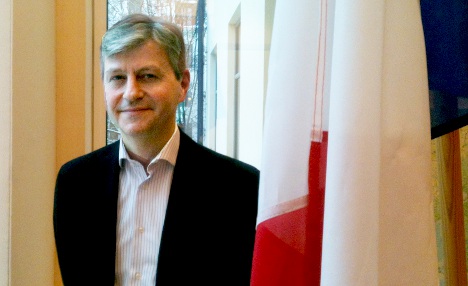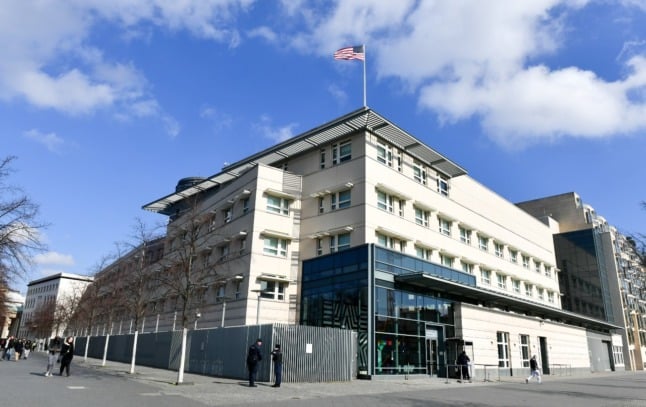A red-haired Viking puts a smile on the face of France’s discrete ambassador, who took on the task of managing French affairs with the relatively sedate Sweden after years of high-octane crisis response efforts at the United Nations in New York.
“I had to stop telling people that Röde Orm was my favourite Swedish book because I didn’t want to give the impression that I’m comparing Sweden today to what it was like in the 11th century,” says Jean-Pierre Lacroix, France’s ambassador to Sweden since 2011.
Röde Orm, translated to ‘The Long Ships’ in English, is the tale of a red-haired Viking zipping across the planet. Despite the ambassador keeping his appreciation of what he calls a “witty and tongue-in-cheek page-turner” under wraps, Lacroix still thinks it invites comparisons with modern Sweden.
“Swedes can be very merry, they’ll sit down for dinner parties for hours, and they still like to travel the world,” he says.
It is rather apt that a diplomat cites a tale of travel among his favourite books.
Lacroix also mentions Graham Greene and Joseph Conrad, both authors dealing with the human heart and morality, fitting favourites for someone who spent a large part of his career at the United Nations in a “carousel of crises”, ranging from Georgia to Darfur.
“It was intense,” Lacroix says with a wistful tone.
The minimalist corridors of the French Embassy in Stockholm are a far cry from the green marble of the UN’s Modernist tower by the East River.
The ambassador is soft spoken and measured, although the travails of Röde Orm does bring a smile to his face.
Lacroix studied at Sciences Po Paris and ENA, two of the top universities in France that have long groomed the country’s political and bureaucratic elites. He slightly dodges a question, true to the required skills of any diplomat, about whether social mobility has improved in France, and whether it is easier to work your way up in Sweden.
“I would say, looking at lawmakers, that the Swedish politicians more closely resemble the electorate in terms of age, gender and ethnicity,” Lacroix notes.
“Whether that extends to business is a different question. I would say the development is slower, the top crust is still dominated by middle-aged men.”
In fact, although Sweden is oft cited as an example of a country that takes gender equality seriously, France seems to have outsprinted the Swedes in one area.
“We support moves on a European level to have quotas for women in company boards, which Sweden does not,” Lacroix points out.
“France and Sweden do see eye-to-eye on many things but it is a philosophical debate where Sweden takes a more liberal approach than we do.”
Swedish lawmakers have not always been so laissez-market-faire. When France’s equality minister visited Sweden in October 2012, she asked to learn more about the Swedish move to outlaw buying, rather than selling, sex.
French lawmakers are hoping to introduce a similar law at home by summer 2013.
In general, Lacroix feels that many French have an image of Sweden as much more leftwing than it is. He often feels compelled to explain the many changes to social services and public administration that Sweden has enacted in the past decade.
Complexity, and communicating that complexity in both directions, is “what makes my role interesting,” Lacroix says.
Reversely, he feels many Swedes are stuck with an older, traditional image of France, a country with strict hierarchies and a propensity for labour strikes. The reality in France “and all European countries” is much more complex, he says.
“There is no point in painting a picture of your country that is too rosy, that is not credible, but we can show its complexity.”
He thinks the space dedicated to French news in Swedish media is “reasonable”, but adds, almost as an afterthought, that more background and detail would not go amiss in most press, not just the Swedish newspapers.
“Although we have no official comment on how the press behaves, we are not North Korea.”
He does, however, offer an example where he would have liked to see more background.
“The Depardieu story, for example, was catchy but there wasn’t much description of government policy,” Lacroix notes.
The story of French actor Gerard Depardieu moving to Belgium to escape new taxes made headlines worldwide. Most renditions of the story focused on the film star escaping a Robin Hood tax on the rich.
As far as sweeping public spending cuts and tax hikes for middle-income earners were concerned, however, precious few column inches were set aside, Lacroix notes.
“Everyone has been asked to contribute to tackle the budget deficit.”
That everyone pitch in has, of course, also been the flavour of the year more widely in Europe. Everyone from Swedes to Romanians, from French to Estonians have been forced to rub shoulders more than ever in the off-white corridors of Brussels to sort out the European debt crisis.
“No one thinks the job is done,” Lacroix says.
“But our job has been to reassure the outside world that we will defend the euro. I’d say that 2012 was the year that our determination beat the scepticism.”
Of Sweden’s role he says simply that the union must find a way to safeguard all actors’ influence, but find a way to relate it to how directly those actors are affected. Sweden does not, after all, have the euro.
“But I think Sweden has a keen interest in a strong eurozone,” Lacroix says.
“There is a lot of common sense in Sweden so I’m not worried about Sweden vis-à-vis the EU.
“The Swedes have questions about how to preserve their country’s influence when the eurozone is integrating. One used to talk about a two-speed union, with euro and non-eurozone members, but the truth is that it is probably a three-speed or many-speed union by now.
“We need to be creative and flexible. Many europhiles want to emphasize the idea of the EU as a peace project but I think it is in essence a pragmatic union. It is cumbersome and it is time-consuming, and we have to define constantly what our common European interests are, but the union is feasible as long as there is a willingness to work together.
“The union allows us to attain critical mass, it gives us clout. The alternative is for each country to fend for itself against the big guys like the US, China and India.”
These are not, of course, surprising words from a French diplomat. But after this long chat about inter-European fraternité, The Local somewhat unwittingly stumbles across something that ties into the free trade esprit of the European Union, but at the same time could be rather insulting to Swedish bakers.
The French embassy in Stockholm imports its baguettes frozen from Finland.
Ann Törnkvist



 Please whitelist us to continue reading.
Please whitelist us to continue reading.
Member comments